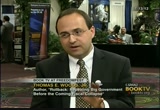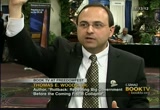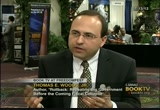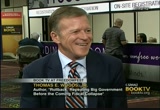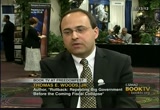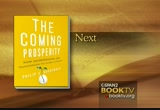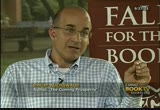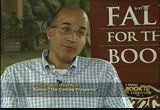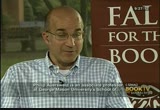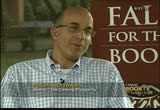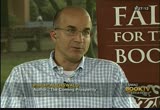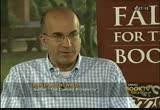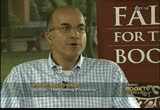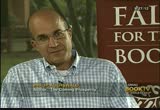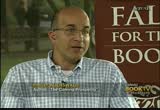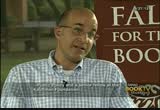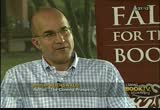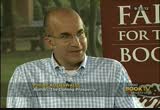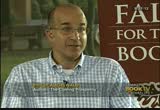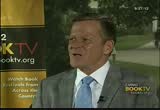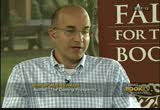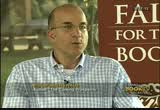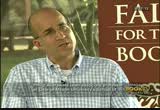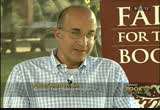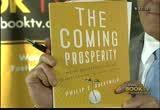tv Book TV CSPAN December 1, 2012 2:30pm-3:00pm EST
2:30 pm
wrong. and in fact, it is going sound i know i'm not supposed to say this. when you look at how many economists are districtly or indirectly on the fed's payroll it's like a giant cartel. everybody knows you don't speak ill of the institution. if you want to get the research grant you shut your mouth. most economists don't think about. they have been responsible for the financial crisis. it's a time when allen green span is pushing interest rates at the super low levels and telling people the fundamental of housing market are sound. you should take out adjustable rate
2:32 pm
why did the economist know there was a financial crisis coming. were they using a -- how can they know? that's what meltdown is about. i written a lot about u.s. history. the first time c-span covered my the politically incorrect guide to american history. it's one of the book, the title itself. my favorite c-span memory was at at the borns and noble there to do a book signing. my publishers forget to tell me
2:33 pm
c-span was coming. i get there and the manager of the store says c-span is setting up over there. i said, i'm sorry, what? c-span is -- i had to respondent usely come up with an hour's talk on the spot. it went great. i came to the conclusions i should not script any of my talk. it was a turning point in my life thanks to you guys. >> what is your background? educationally bachelors from hoovered. ph.d. at colombia in u.s. history. i taught. i've been a senior fellow at the institute. and now i run my own educational thing called liberty classroom.com. now that we're living in the information revolution, it's a revolution that makes ambiguitien berg look like a bum. i teach u.s. history to anybody who is interested in learning about it through the site. i keep busy. >> you live in kansas. >> yes. we have to me on for another
2:34 pm
show about the backdrop to that. yes, indeed. >> is ited a venn teenage use in your view to live outside some of the major cities of the u.s.? >> it could be. i mean, obviously there are pros and cons. we miss living near new york city. obviously we had a severe crisis, which i hope we don't. i'm not sure that large population centers where somebody would want to be. obviously it would be unthinkable should happen. it's not why we moved, if there were a really bad attack of one type of another, we don't live in a concentrated area. there are advantages. >> we have been talking with thomas woods junior. the most recent book "rollback: repealing big government before the coming fiscal collapse." this is booktv on c-span2 on locations in las vegas. booktv on facebook.
2:35 pm
like us to interact with booktv guests and viewers. watch viewers, get up-to-date information facebook.com/booktv. booktv sat down with philip auerswald to discuss his book "the coming prosperity: how entrepreneurs are transforming the global economy." he was in atense for the fall for the book festival held annually at the university. it's about a half an hour. now joining us here at george maison university is professor philip auerswald. the most recent book is "the coming prosperity: how entrepreneurs are transforming the global economy". here's the cover of the book. professor, what role does -- play in economic development? >> well, that's a great question, and maybe i'll talk
2:36 pm
about what role does fear play in our conversation about. the conversation about the present. when we talk about our reality and share our idea in a marketplace, we're competing with other ideas. we know three things about marketplaces for ideas. short term sells better than long-term, fear sells better than hope, negative sells better than positive, and exaggerated sells better than moderated. so we see a disproportionate number of short term narrative of negative, exaggerated stories essentially. so short term negative exaggerated. that is overrepresented in the marketplace of ideas. there's good reason for that. creature grew up in environments where we were always subject to
2:37 pm
threat. we're looking at that thing that is going to hurt us. we are no longer in the environment. we're in a complex economy the inner dependent that really relies on organizations to provide us with the necessities. so we have to update our thinking, and think longer term, focus on stories that actually represent trends, and not compage -- exaggerate noise. we have to get away from fear. fear played a role in the development of human societies in the earliest stages, it's encoded in the dna, but to evolve, to a sort of complex modern stliermt we live in, we have to update the most basic aspects, so that's what your question speaks to if. >> -- full venture capitalist? >> you know, the opposite of that might be say, well, venture
2:38 pm
capitalist has to be inherently optimistic, why would you invest in thing where there are uncertain returns and so forth. telling the story about "the coming prosperity." that's a story, you know, easily characterized. and i really don't see it that way. from my standpoint, when think about optimism, i think the definition of an optimist is somebody who is systemically late. who doesn't get the true destruction of outcome is. and a pessimist is someone systemically early. they are there an hour in advance. had to be sure. we know the people too, right. so you adopt want to be systemically wrong about the true distribution of things by underestimating the kind of bad or expected things that can happen or overestimated them. i don't feel like i'm doing either. this -- venture capitalist have
2:39 pm
to be in the same world. we can't survive as optimist or pessimist. they have to look what the capability are and the team and the market and demand is. and put resources where they are needed to create the future. and that's what i'm talked about. >> you're saying you're not necessarily optimist. the book is optimistic even though we are in a time of lot of economic upheaval in the world. >> see, so, again, it goes beyond that. we're in a time of tremendous economic upheaval. i agree with that. right. butlet con tect lose two ways. first of all, ours is the most dynamic and promises era in human history. okay. why? in our lifetimes, the majority of the world's population is joining the global economy. what does that mean? when japan industrialized they brought roughly 30 million
2:40 pm
people out of poverty. when china joined they brought about 300 million people out poverty. that's been a big story. chinese savings in the world financial market were a part what drove the most recent about new welt wealth in the world. as brilliant a man as allen green span was unable to grasp the reality of our historical moment. it was in part due to that failure that somatic errorrers were made that lead to the meltdown in-housing crisis. in inadequate response, policy to what was really a change in financial market due to growth elsewhere in the world. in the next twenty to thirty years, 3 billion people are joining the global economy. it's going to be a transformation ten times what we
2:41 pm
have seen which was ten times what happened in japan. now if 3 billion people are suddenly given cognitive freedom, suddenly not thinking just moment to moment, day-to-day, in a existence but are creators, are collaborators, are new contributors, human beings are not just consumers. they are producers. and that's what this is about. it's the possibility that are created when that happens. and i'm certainly not the only person. >> well, who is one of the entrepreneurs that you profile? that you discuss in the coming "the coming prosperity: how entrepreneurs are transforming the global economy"? >> i'm talking about the global trends. there's a seeming inevident ability to that. i'm talking about the increasing prosperity and people joining and the great things. but the other piece is exactly what you asked. what role do people play?
2:42 pm
nothing happens in human society unless people make it happen. and i used the word entrepreneur. i'm talking about the creator of the future. you talk about venture capitalist. there are other people. artist who are creating the future. right. and so when we think about, you know, those stories that are a center piece of the book, it's a big part why i wrote the book was to share the stories i have learned people i have gotten to know in eight years of editing an journal called quality innovation." just one is a gentleman who is a optometrist in southern india and in the late 1970s retired. as the retirement project he was about 58 and he wanted to cosomething for the community. and so he decided he was going try to address the problem of need less blindness due to cat rick. in the united states it's a
2:43 pm
minor outpatient process. in the rest of the world terrorist -- there's over a hundred million people blind because of cat rick. he started the cloing in the home. he had 11 beds and family members helped him and he got it off the ground. anyway, cut forward not just one or two or three great ideas, but hundreds of innovations. tenacity of an entire team of people global team of people involved larry who is one of the folks who contributed to the eradication of smallpox. brilliant social -- worked together to build the hospital. to this day they have cured 3 million people of blindness. now imagine entire washington metro area. about 3 million people. imagine all those people blind. now they can see.
2:44 pm
that's not -- that's not an obscure story. it's not an obscure story in the world of people. people know about the hospital. people travel from all over the world to go to the hospital to train to bring the same programs to their countries. it becomes a movement to end needless blindness. it's one example you might say that's -- got to be an exception. hundreds and hundreds of stories like that. and those are the stories that are transforming the global economy. not just the economy, societies building the future. >> so as you say in the next twenty years, 3 billion more people will enter to the world of economic freedom or another least -- >> right cognitive freedom. economic freedom. >> is the wild west does it need to be managed? how should it be managed? >> well,, you know, i like the
2:45 pm
core metaphor in describing the economy and the interaction of the economy and the society is reinforced. and when we go the rain forest whether it's the pacific northwest or amazon, you have the sense of life around you. the complexity. that's what human society is. right. the rain forest is a self-regulating environment. when we put regulations in we put government regulations in. part of self-regulation. when we self-regulate ourself we create rules for ourself that's self-regulation. we do it through competition. scarce resources. the map thing that keeps the rain forest vibrant is you have the canopy, which in the u.s. economy would be the big firm. the ge, the gm. the walmart all of that. you have the scruff, the small business.
2:46 pm
but it's the small and growing. it's the things that were small but can challenge the big. it's what happens when the big tree falls over. we have been to the rain forest. the amazing thing new trees grow out of the old. it's a metaphor. it's real. when we lose something big in the economy. it's vital we know how to recon fission your the resources and create something new. do we need control? we need feedback. we need the capability to repurpose. in this country, we need to build a robust platform for people to realize what they have inside of them. that's why people came to this country and that's why people here look for a better future that will be like the better future their ancestors left when they came. so, you know, i would say, yes, you know, we need control, we
2:47 pm
need controls all kinds of inner dependency and self-regulation and ways of understanding what is happening, what's not, where do we want to go and what gets us the end point. betterment of human lives. it's not increased -- what kind of lives do we live and find purpose and meaning. >> professor, one of the trees to take the rain forest analogy, gm a couple of years ago nearly went bankrupt, did go bankrupt was bailed out by the federal government. should it have been bailed or should have t have been allowed to fall? >> i'm just on the verge of flipping on that one. i'm just on the verge of flipping on that one. >> we did the same thing with chrysler. >> i talk about gm in my book, and, you know, and, you know, um, charles wilson, you know,
2:48 pm
allegedly said what is god for gm is god for america. actually never said that. i looked in to it. i was going to use the quote. i thought it characterized the worse of the corporatism and feeding the elite, the incumbent industry. he didn't say that. he was a courageous guy. he cut the defense budget by 20% in the late 1950. the budget cuts in the late 1950s were the number one reason we had silicon valley. a lot of radio engineers had moved out there there. it was a beautiful part of the country. suddenly they didn't have jobs. they were saying well, you know, we want to stay here. and they created eventually intel and the rest. >> so we were in a very tenuous moment, we had a financial crisis. there was a financial crisis that lead to that crisis industry. and adding on top of that
2:49 pm
scrolgly the failure of the three automakers. tough, tough call. by the way, i don't know why anybody in this presidential election mentions this was a bush program. [laughter] you know, i mean, i have a chapter about ford. i'm not concerned about partisan politics. we have to get history right. it started in one and continued to the other. that's not what it's about either. what would have happened if we let it go. the manufacturing -- [inaudible] all the contracts out the door. could tells will come in and buy the three factories and scale itself by a factory of ten out of the resources. what would have happened if we had the courage to do that? again, i'm thinking that that would have been a big risk. but it would have been exciting. and it might have been a great thing for american auto industry . >> we are talking with philip
2:50 pm
auerswald professor at george mason university. the most recent weak "the coming prosperity: how entrepreneurs are transforming the global economy" you served as an adviser to the clinton global initiative. what are you advising them on? >> thank you asking me that question. i was there at last three days. and i've been working with them for the last three years, the reason i'm thanking you is that i really appreciated that affiliation. they have a wonderful platform there, and the advicers on the program what sort of things to future, what sort of people bring new idea, and challenge that audience to think about very different ways to engage the world. it's particularly relevant because in every participant's bag, as they register for the clinton global initiative they received a copy of "time"
2:51 pm
magazine which president clinton had authored an essay titled "the case for optimism" and at the clinton global initiative this year chelsea clinton lead a session entitled "case for optimism." she was interviewed by charlie rose. that was the focal point of the interview. i'm with that message. focused on finding collaborative solutions to world's greatest challenges. we have a lot of great challenges. we don't address those challenges by propagating exaggerated narratives. we do it by finding creative and working together and working together to build a future we can create in. we can solve the problem by focusing on those. a lot of big companies in america -- and caters if is the
2:52 pm
right word sell to the federal government and go on policy that are good for selling to the federal government. the federal government is a big customer. is there a god trend the way our economy should be structured? >> yeah. well, again, you know, actually ties back directly to the question you just asked, and, you know, it's god to contextualization. the entrepreneurship and he must be over there, and on the other hand i'm saying i have his high regard for president clinton. i don't know if i talked about hillary clinton, okay, just because i was there. i heard her speak. she gave a speech you can take away the secretary of state title and take away the hillary clinton name just look at the text, the speech she gave on development assistance was one of the most accurate, honest, and even courageous speeches i
2:53 pm
have seen on the topic of international. what did she say? a cup the the of things that no one says. number one object, she listed three. it was the third and the most significant of development assistance program should be work to themselves out of business. she said that. development the assistance is not in the business of self-propagation. it should be there should be a timeline when does end? when did do we stop and leave in haiti or pakistan anywhere else in the world. time line to zero. vitally important. she said that. the second thing getting back to the question, had to do with corruption. she talked about corruption as an obstacle to development. tied a line directly between corruption in poor countries and corruption in the united states inside the contracts that are fedback. she talked about development. we can talk about a lot other
2:54 pm
systems and tieing that line that we are also part of the world subject is the same kind of forces of incumbent economic interest capturing the political process, getting government contracts, and effecting outcomes. we are also subject to that. to see somebody like that saying that. it's true and deeply important. philip auerswald. you whereabout the current telecommunications revolution that we're all living. >> trying to understand and manage. >> right. >> help us. >> well, okay. first of all, we have to understand the difference between a mobile phone and a rich country. and a mobile phone -- so before the mobile phone only two technologies had spread as widely as the mobile phone. no technology has spread as rapidly as the mobile phone. the other recent one was the
2:55 pm
radio and fire was before that. so what is the -- we know that mobile -- means in the and smartphones mean. what it does it mean for the majority of the world's population. it's the communicat. we have built highways, communications highways, in to places and connecting people that were never connected. in afghanistan, i talk about the story you asked me about entrepreneurs. it's another entrepreneur who is responsible for creating the afghan cell phone company. this is biggest story in afghanistan in the last ten years. we don't hear about it. why? because, you know, the fact that more afghans today have access to mobile devices than know how to read or write. a decade ago they would have had to walk 700 miles to make a phone call. it's a story. a big story. i would imagine for an order are
2:56 pm
in afghan it means a lot to them in term of the ordinary capability. what is more excited when we build the railroad. there's a lot of lore and movies made. what happens when you build a railroad the land on other side of the railroad, the land around the railroad station gets valuable. you can provide services now that you couldn't provide before. it's the next generation. when we build on the side of the telecommunications highway. mobile health, mobile banks, a whole array of services that we can cannot deliver because we are using frontier technology. it's powerful thing. it will have leg for the next twenty years not to mention everything et. cetera that my friend pert talk abouts in the book. it creates so many possibilities. >> who is "the coming prosperity" written for? >> well,, you know, it's written for the folks watching this
2:57 pm
show. general audience in the united states but globally. i start in the u.s. i end in the u.s. i feel as though the story is particularly needed in the united states. i don't believe that people in pakistan, or china need hear this because they see it. even though pakistan has struggled so much potential. i think it's the next global opportunity if i didn't have resources i wouldn't tell people that. i would be investing there. it's on the cusp of happening. really exciting. and so it's people in this country, and it's anybody who believes there's possibility in the future wondering why it's not happening. >> so why are china, india,
2:58 pm
pakistan, why where they are economically if they are on the cusp. what is not going right there that is going right here in the united states. >> pakistan does not have the mom tument of china or india. they are in a different category. brazil, the last ten years. again, you know, highly growing. it's been evolved. the thing that strains growth in every country. when i do, which i do i will go places like the world bank and, you know, if i'm invited to share my thoughts folks who work on policy issues there tps. the same thing in the united states government and, you know, i can boil down my policy recommendations to one thing, one message from a policy standpoint from the book favor incumbents less. economic incumbents. favor incumbent less. now pakistan had an era of really dramatic growth in the 1960. pakistan was created today, right, we think of korea, -- but
2:59 pm
in the 1960s that was pakistan. people thought it was going to be a huge success. there were a big ally of ours. what happened in pakistan is you had the open space and you had a bunch of people rush in to take advantage of the opportunity of a newly created country a strange country of a lot of folks from the job of came over due to partition. a tumultuous time. those families got control in the political apparatus. people talk about the unstability in pakistan. from an analytic standpoint there hasn't -- not the political instability the turn yoafer of the presidency. the structure has been dominated by the same group of people. same thing in egypt. mubarak left, but pakistan and egypt is not different stories. the military in both countries controlses upwards of 40% of the economy directly. and the rest
86 Views
IN COLLECTIONS
CSPAN2 Television Archive
Television Archive  Television Archive News Search Service
Television Archive News Search Service 
Uploaded by TV Archive on

 Live Music Archive
Live Music Archive Librivox Free Audio
Librivox Free Audio Metropolitan Museum
Metropolitan Museum Cleveland Museum of Art
Cleveland Museum of Art Internet Arcade
Internet Arcade Console Living Room
Console Living Room Books to Borrow
Books to Borrow Open Library
Open Library TV News
TV News Understanding 9/11
Understanding 9/11